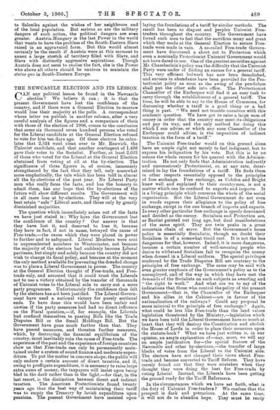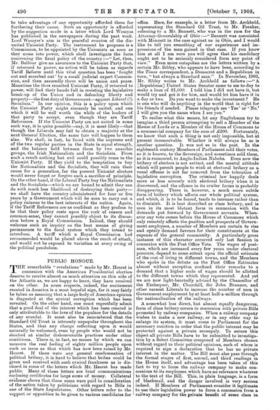THE NEWCASTLE ELECTION AND ITS LESSON.
CAN any political lesson be found in the Newcastle election ? We believe it can ; it is that the present Government have lost the confidence of the country, and if there were a General Election to-morrow would lose their majority at the polls. A correspondent whose letter we publish in another column, after a very careful analysis of the figures and a comparison of them with those of the election of 1906, comes to the conclusion that some six thousand seven hundred persons who voted foi. the Liberal candidate at the General Election refused to vote for him ten days agO. Of these electors he calcu- lates that 2,524 went clean over to Mr. Renwick, the Unionist candidate, and that another contingent of 1,498 gave their votes to the Socialist. Further, at least 2,663 of those who voted for the Liberal at the General Election abstained from voting at all at the by-election. The significance of these °figures is, of course, immensely strengthened by the fact that they tell, only somewhat more emphatically, the tale which has been told in almost all 'the by-elections of the past year. No Liberal Party man Who really faces the facts, and has the honesty to admit them, has any hope that the by-elections of the future will show different results. The Government will in all cases lose at by-elections. They will at the very best retain " safe " Liberal seats, and those only by greatly diminished majorities.
The question which immediately arises out of the facts we have just stated is : Why have the Government lost the confidence of the country ? Our answer is that they have lost it, and deserved to lose it, because they have in fact, if not in name, betrayed the cause of Free-trade,—the cause which they were placed in power tolurther and to safeguard. Liberal Members were sent in unprecedented numbers to Westminster, not because the majority of the electors had suddenly become Liberal partisans, but simply- and solely because the country did not wish to change its fiscal policy, and because at the moment the only method available for preventing the dreaded change was to place a Liberal Government in power. The country at the General Election thought of Free-trade, and Free- trade only, and assumed that it could trust the Liberals not to use a victory obtained by the transfer of thousands of Unionist votes to the Liberal side to carry out a mere party programme. Unfortunately the confidence thus felt by the electors has not been justified. The Liberal Govern- ment have used a national victory for purely sectional ends. To have done this would have been unfair and unwise if the party measures had had no direct influence on the Fiscal question,—if, for example, the Liberals bad confined themselves to passing Bills like the Trade Disputes Bill or the Small Holdings Bill. But the Government have gone much farther than that. They have passed measures, and threaten further measures, which, by destroying the financial equilibrium of the country, must inevitably ruin the cause of Free-trade. The experiende of the past and the experience of foreign countries show us that Free-trade can only be permanently main- tained under a system of sound finance and moderate' expen- diture. To put the matter in concrete shape, the public will only endure a certain amount of direct taxation, and if, owing to profligate expenditure, it is necessary to raise large extra sums of money, the taxpayers will insist upon being bled in the dark rather than in the light,—for that, in the last resort, is the distinction between direct and indirect taxation. The American Protectionists found twenty years ago that the best way of maintaining their tariff was to empty the Treasury by lavish expenditure upon pensions. The present Government have insisted upon laying the foundations of a tariff by similar methods. The result has been to disgust and perplex Unionist Free- traders throughout the country. The Government have forced such men to feel that the sacrifices many and great which they made at the General Election to secure Free-. trade were made in vain. A so-called Free-trade Govern- ment have discovered a short cut to Protection which even a nominally Protectionist Unionist' Government would not have dared to use. One of the greatest securities against Mr. Chamberlain's policy was the difficulty that the Unionist Party were under of finding an excuse for a general tariff. This very efficient bulwark has now been demolished, and excuses in abundance have been provided for the Pro- tectionist policy as soon as the swing of the pendulum " shall put the other side into office. The Protectionist Chancellor of the Exchequer will find it an easy task to carry through the establishment of a general tariff. The time, he will be able to say to the House of Commons, for discussing whether a tariff is a good thing or a bad thing is past. " We need not trouble ourselves with this academic question. We have got to raise a large sum of money in order that the country may meet its obligations ' and pay its way, and the only method for doing this which I can advise, or which any sane Chancellor of the Exchequer could advise, is the imposition of indirect taxation in the form of a tariff."
The Unionist Free-trader would on this ground alone have an ample right not merely to feel indignant, but to express his indignation by his vote. But this is by no means the whole reason for his quarrel with the Adminis- tration. He not only finds that Administration indirectly and unconsciously Protectionist, or, at any rate, deter- mined to lay the foundations of a tariff. He finds them in other respects essentially opposed to the principles of free exchange. Free exchange, as Cobden and Bright knew well and explained to their countrymen, is not a matter which can be confined to exports and imports. It is a living principle which concerns the whole of the social organisation. But the Liberal Government 'do not even in words express their allegiance to the policy of free exchange, except in the one branch of imports and exports. Iu every other particular free exchange is openly denounced and derided as the enemy. Socialism and Protection are, as Bastiat pointed out long ago, but dual manifestations. of the same spirit. They are twin peaks in a great mountain 'chain of error. But the Government's home policy is essentially Socialistic, though no doubt their Socialism is of a somewhat timid cast. It is not the less dangerous for that, however. Indeed, it is more dangerous, because a certain number of well-meaning people who . desire to withstand Socialism fail to recognise the enemy when dressed in a Liberal uniform. The special privileges conferred by the Trade Disputes Bill are contrary to the principles of free exchange. The same may be said with even greater emphasis of the Government's policy as to the unemployed, and of the way in which they have met the demands of the Socialists on such subjects as sweating and ' " the right to work." And what are we to say of the indications that those who control the policy of the present • Government—that is, the Chancellor of the Exchequer and his allies in the Cabinet—are in favour of the nationalisation of the railways ? Could any proposal • be more inimical to the principle of free exchange ? Again, what could be less like Free-trade than the land values legislation threatened by the Ministry,—legislation which we have been told the Liberal Government have so much at heart that they will destroy the Constitution and abolish • the House of Lords in order to place their measures upon the statute-book ? What we have just written is,• in our opinion, an ample explanation of—nay, more, we will say an ample justification for—the special feature of the Newcastle and other by-elections,—the transfer of -large blocks of votes from the Liberal to the Unionist side. The electors have not changed their views about Free- trade and become converted to Tariff Reform. They have merely found out that they were mistaken when they thought they were doing the best for Free-trade by voting Liberal. Instead, the Liberals have been getting the ground ready for the Tariff Reformers.
In the circumstances which we have set forth, what is the duty of Unionist Free-traders ? We confess that tha prospect is dark and precarious. At the same time, it will not do to abandon hope. They muse be ready to take advantage of any opportunity afforded them for furthering their cause. Such an opportunity is afforded by the suggestion made in a letter which Lord Wewyss has published in the newspapers during the past week. Lord Wernyss's aim is the peaceful reunion of the dis- united Unionist Party. The instrument he proposes is a Commission, to be appointed by the Unionists as soon as they come into power, which shall investigate the facts concerning the fiscal policy of the country :—" Let, then, Mr. Balfour give an assurance to the Unionist Party that, if returned to power, no action will be taken as regards Tariff Reform until this vital question has been fought out and searched out' by a small judicial expert Commis- sion, and then assuredly there will be union and peace. Meantime the thus reunited Unionist Party, if returned to power, will find their hands full in resisting the legislative break-up of the Union and in defending liberty and property—the first duty of Government—against Liberal (!) Socialism." In our opinion, this is a policy upon which the Unionist Party might sincerely be united, and one which it will be well worth the while of the leaders of that party to accept, even though they are Tariff Reformers. If the Unionist Party are not united in some such way, it is quite possible—nay, it is most likely—that though the Liberals may fail to obtain a majority at the next General Election, the same fate will happen to them also.. We shall, in fact, be faced with the supreme evil of the two regular parties in the State in equal strength, and the balance held between them by two anarchic groups, the Irish Nationalists and the Socialists. From such a. result nothing but evil could possibly come to the Unionist Party. If they yield to the temptation to buy the Nationalists and the Socialists, they will ruin their cause for a generation, for the present Unionist electors would never forget or forgive such a sacrifice of principle. On the other hand, if the Liberal Party buy the Nationalists and the Socialists—which we are bound to admit they can do with much less likelihood of destroying their party— we shall have the country administered for four or five years by a Government which will be sure to carry out a policy ruinous to the best interests of the nation. Again, if the Tariff Reformers are as confident as they profess to be that their policy rests upon the rock of reason and common-sense, they cannot possibly object to its discus- sion before a Royal Commission. Indeed, they should 'Welcome such an inquiry as the best means of giving permanence to the fiscal system which they intend to introduce. A tariff which a Royal Commission had recommended would be placed above the reach of attack, and would not be exposed to variation at every swing of the political pendulum.

























































 Previous page
Previous page